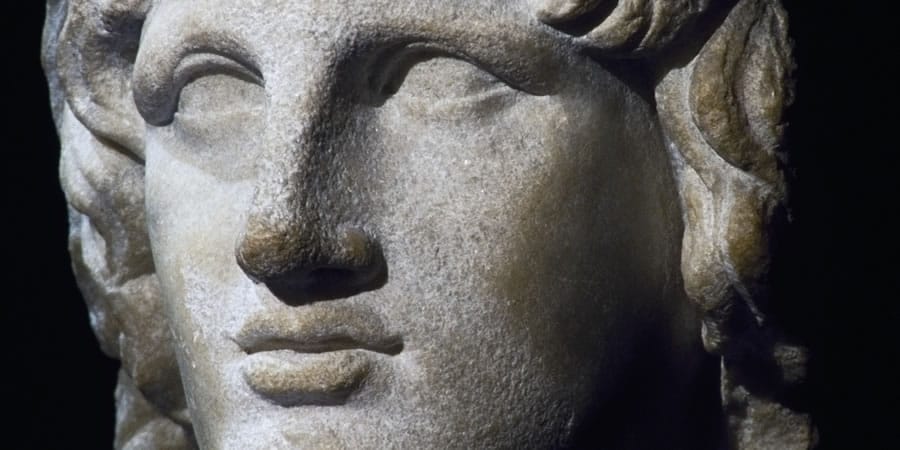
Alexander the Great essay
By deeds, it is incredibly hard to compare Alexander the Great with any of the great generals in the history of humanity. Indeed, Alexander the Great’s conquests have had a strong influence on all the subsequent generations, and his generalship became a classic for people dedicated to the military affairs. In fact, he is often referred to as one of the most powerful and skillful leaders of all time. However, was he more a force for “good” or “bad”? Should he be called/considered “great”? These are all questions, which create disputable debates that have been going on for the decades. Hence, this paper will examine the life and actions of Alexander the Great in order to answer the above-mentioned questions and consider whether he should be called “great” or not.
The hero of the ancient world was born in Pella (Macedonia) in 356 B.C.E. Alexander was the son of Philip II, the King of Macedon and Olympias, the daughter of King Neoptolemus. Plutarch, Alexander’s biographer, admits that, in fact, Olympias “dreamt of a fiery thunderbolt that had entered her body, whereas his father… envisioned in his dream a seal on his wife’s body in the shape of a lion, which allegedly foretold the extraordinary ‘lion-like’ nature of his son” (Nawotka 1). Gifted by nature, Alexander the Great soon discovered the pursuit of military glory. His father, a participant of the military conflicts of the ancient Greek world, has greatly contributed to his striving for military glory. The future great general got a perfect Hellenic upbringing: his mentor was, perhaps, the most famous ancient Greek philosopher Aristotle. Alexander was taught by him between 13 and 16 years of age.
In the battle of Chaeronea (338 BC) against the combined armies of Greek city-states, Alexander commanded the cavalry, whose attack ensured the victory of the Macedonians. Gabriel states that he “used the new military instrument to establish an empire. He invaded and defeated the Persian empire by force of arms” (185). In fact, among the most essential contributions of Alexander was “the design of logistics and siegecraft capabilities, which set the standard for future Western armies” (Gabriel 188). As a result, this victory has led to Macedonian supremacy in Greece. However, for the winner it was the last victory in his life. King Philip II, who was preparing for a large military campaign in Persia, was killed by conspirators in August 336 BC. After his father’s death, 20-year-old Alexander executed all the conspirators. Together with the throne, the young king of Macedonia received a well-trained army, the core of which consisted of heavy infantry units – spearmen armed with long lances.
For two years (336-334 BC), Alexander managed to restore the intermittent power of the Macedonians in Greece and break barbaric Thracian tribes that threatened Macedonia to the north. Combining almost all of Hellas under his rule, Alexander realized the idea of his father – made a campaign against the Persian Empire – a longtime opponent of the Greek states. In this campaign, Alexander was able to demonstrate his exceptional leadership talent that brought him cult fame as the greatest conqueror.
In 334 BC, Alexander’s troops crossed into Asia through the Hellespontine strait and moved inland to the Persian dominions. As a result of the battle with the Persians at the Granicus River, a large part of Asia Minor went into the hands of the Macedonians.
In the next two years, the Macedonians conducted a victorious march across the Middle East, almost without encountering serious resistance. In Egypt, Alexander himself named a city after him (Alexandria) – the first city of the Greek-Macedonian colonies in the East. By encroaching on the central area of the Persian Empire, he defeated Darius III at the Battle of Gaugamela, after which he conquered Babylon and made it his capital city. Under the banner of revenge, he undertook a campaign against Bessus (Artaxerxes IV) and conquered Central Asia in 328 BC.
On June 13, 323 BC, Alexander the Great died suddenly in Babylon. “Alexander’s death, symbolically marking the end of an era, evoked an eruption of sorrow among Macedonians and Persians alike” (Nawotka 377). As a result, the huge country disintegrated after his death. In fact, the campaigns of Alexander the Great have laid the foundation for the history of the so-called Hellenistic civilization, combining Greek and ancient Middle Eastern traditions.
Based on the above-stated information, Alexander the Great can be considered to be “great” because of his successful military successes, from an early age he was understood as an achiever; he was able to conquer the huge territories (most of the World) on a superhuman scale and established a new empire. In fact, the greatness of Alexander the Great cannot be overstated. Even “the Romans respected his remarkable martial prowess, seeing themselves as the true successors of the world hegemony briefly created by Alexander” (Overtoom 1). However, there were some individuals who admitted that he was more a force for “bad,” and thus, could not be considered to be “great” since “there was much disharmony among Alexander’s generals and soldiers” (Brown 69) with regard to his steadfast striving for reaching the end of the Earth. In addition, his “preoccupation with a personal legacy of conquest resulted in the death of hundreds of thousands of his own soldiers” (Brown 69).
All in all, despite the fact that sometimes Alexander the Great is not referred to as “great,” there are different reasons to consider him to be “great.” In fact, he is one of the most powerful and skillful leaders of all time due to his successful military successes and achievements. Thus, Alexander the Great can be called “great” since he was able to conquer most of the World and left people with an authentic style of military campaigning.

